Organisational Behaviour Report: Unit 12, KPMG UK Case Study
VerifiedAdded on 2022/12/27
|21
|5215
|29
Report
AI Summary
This report provides a comprehensive analysis of organisational behaviour, focusing on the context of KPMG UK. It begins by critically discussing how organisational culture, politics, and power impact individual and team behaviour and performance. The report then delves into process and content theories of motivation, such as Vroom's Expectancy Theory and Maslow's Hierarchy of Needs, examining their application and influence on employee behaviour. Furthermore, it differentiates between effective and ineffective teams, exploring team and group development theories to foster cooperation within effective teams. Finally, the report applies organisational behaviour concepts and philosophies within an organisational context, evaluating the relevance of team development theories to enhance workplace productivity. The report incorporates real-world examples and case studies to illustrate key concepts, providing a valuable understanding of organisational dynamics and management practices.

Unit 12
Paraphrase This Document
Need a fresh take? Get an instant paraphrase of this document with our AI Paraphraser
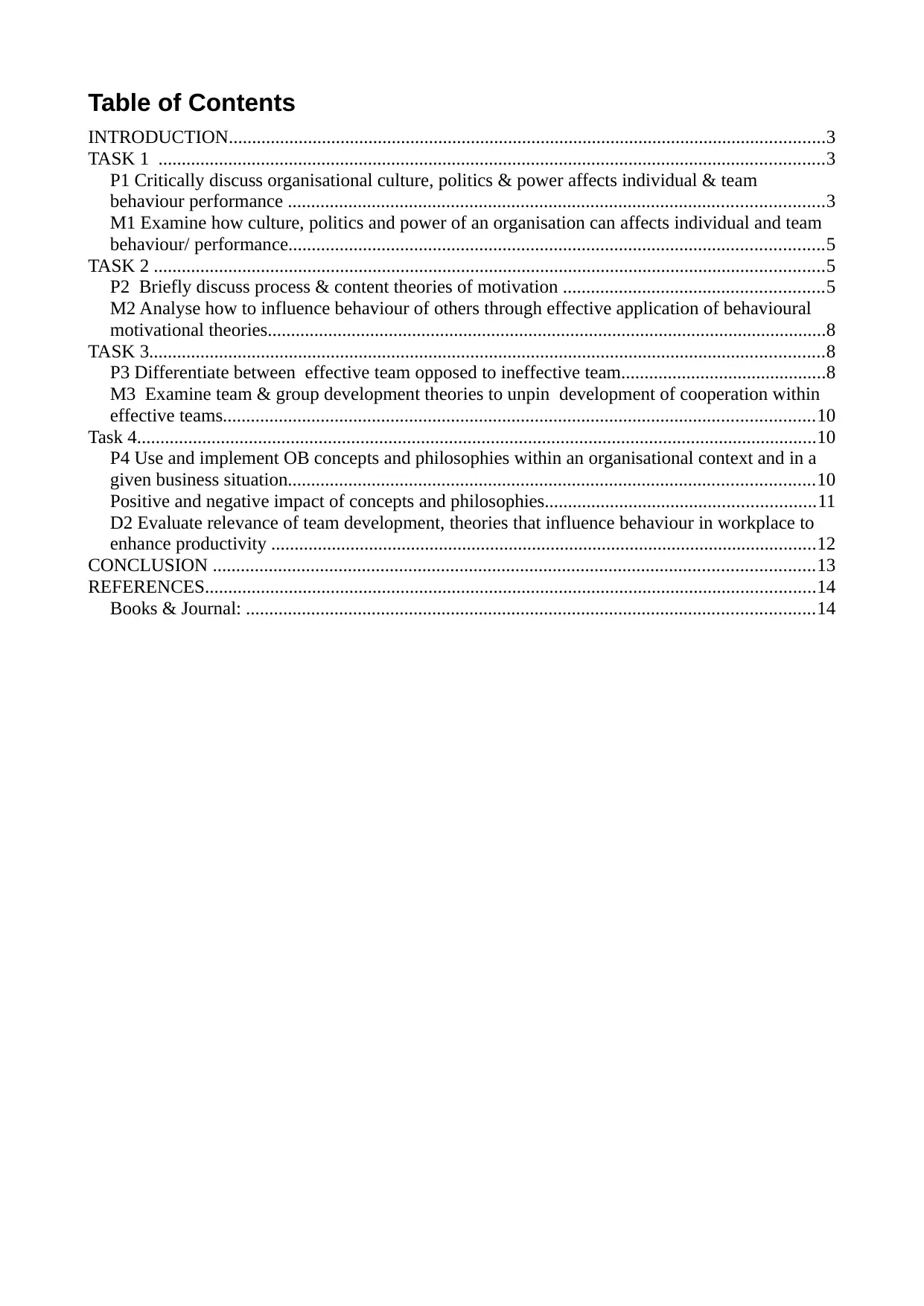
Table of Contents
INTRODUCTION................................................................................................................................3
TASK 1 ...............................................................................................................................................3
P1 Critically discuss organisational culture, politics & power affects individual & team
behaviour performance ...................................................................................................................3
M1 Examine how culture, politics and power of an organisation can affects individual and team
behaviour/ performance...................................................................................................................5
TASK 2 ................................................................................................................................................5
P2 Briefly discuss process & content theories of motivation ........................................................5
M2 Analyse how to influence behaviour of others through effective application of behavioural
motivational theories........................................................................................................................8
TASK 3.................................................................................................................................................8
P3 Differentiate between effective team opposed to ineffective team............................................8
M3 Examine team & group development theories to unpin development of cooperation within
effective teams...............................................................................................................................10
Task 4..................................................................................................................................................10
P4 Use and implement OB concepts and philosophies within an organisational context and in a
given business situation.................................................................................................................10
Positive and negative impact of concepts and philosophies..........................................................11
D2 Evaluate relevance of team development, theories that influence behaviour in workplace to
enhance productivity .....................................................................................................................12
CONCLUSION .................................................................................................................................13
REFERENCES...................................................................................................................................14
Books & Journal: ..........................................................................................................................14
INTRODUCTION................................................................................................................................3
TASK 1 ...............................................................................................................................................3
P1 Critically discuss organisational culture, politics & power affects individual & team
behaviour performance ...................................................................................................................3
M1 Examine how culture, politics and power of an organisation can affects individual and team
behaviour/ performance...................................................................................................................5
TASK 2 ................................................................................................................................................5
P2 Briefly discuss process & content theories of motivation ........................................................5
M2 Analyse how to influence behaviour of others through effective application of behavioural
motivational theories........................................................................................................................8
TASK 3.................................................................................................................................................8
P3 Differentiate between effective team opposed to ineffective team............................................8
M3 Examine team & group development theories to unpin development of cooperation within
effective teams...............................................................................................................................10
Task 4..................................................................................................................................................10
P4 Use and implement OB concepts and philosophies within an organisational context and in a
given business situation.................................................................................................................10
Positive and negative impact of concepts and philosophies..........................................................11
D2 Evaluate relevance of team development, theories that influence behaviour in workplace to
enhance productivity .....................................................................................................................12
CONCLUSION .................................................................................................................................13
REFERENCES...................................................................................................................................14
Books & Journal: ..........................................................................................................................14
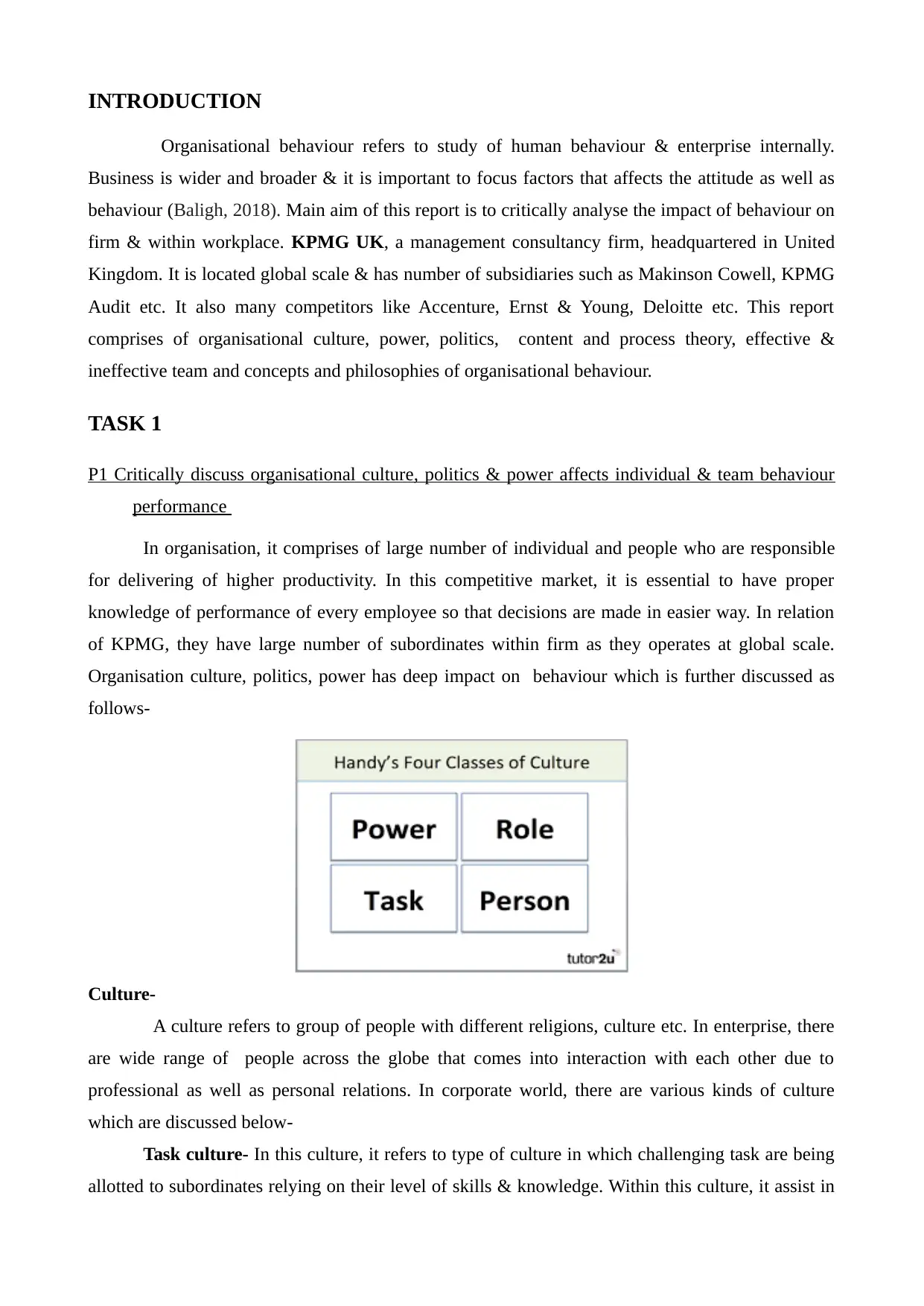
INTRODUCTION
Organisational behaviour refers to study of human behaviour & enterprise internally.
Business is wider and broader & it is important to focus factors that affects the attitude as well as
behaviour (Baligh, 2018). Main aim of this report is to critically analyse the impact of behaviour on
firm & within workplace. KPMG UK, a management consultancy firm, headquartered in United
Kingdom. It is located global scale & has number of subsidiaries such as Makinson Cowell, KPMG
Audit etc. It also many competitors like Accenture, Ernst & Young, Deloitte etc. This report
comprises of organisational culture, power, politics, content and process theory, effective &
ineffective team and concepts and philosophies of organisational behaviour.
TASK 1
P1 Critically discuss organisational culture, politics & power affects individual & team behaviour
performance
In organisation, it comprises of large number of individual and people who are responsible
for delivering of higher productivity. In this competitive market, it is essential to have proper
knowledge of performance of every employee so that decisions are made in easier way. In relation
of KPMG, they have large number of subordinates within firm as they operates at global scale.
Organisation culture, politics, power has deep impact on behaviour which is further discussed as
follows-
Culture-
A culture refers to group of people with different religions, culture etc. In enterprise, there
are wide range of people across the globe that comes into interaction with each other due to
professional as well as personal relations. In corporate world, there are various kinds of culture
which are discussed below-
Task culture- In this culture, it refers to type of culture in which challenging task are being
allotted to subordinates relying on their level of skills & knowledge. Within this culture, it assist in
Organisational behaviour refers to study of human behaviour & enterprise internally.
Business is wider and broader & it is important to focus factors that affects the attitude as well as
behaviour (Baligh, 2018). Main aim of this report is to critically analyse the impact of behaviour on
firm & within workplace. KPMG UK, a management consultancy firm, headquartered in United
Kingdom. It is located global scale & has number of subsidiaries such as Makinson Cowell, KPMG
Audit etc. It also many competitors like Accenture, Ernst & Young, Deloitte etc. This report
comprises of organisational culture, power, politics, content and process theory, effective &
ineffective team and concepts and philosophies of organisational behaviour.
TASK 1
P1 Critically discuss organisational culture, politics & power affects individual & team behaviour
performance
In organisation, it comprises of large number of individual and people who are responsible
for delivering of higher productivity. In this competitive market, it is essential to have proper
knowledge of performance of every employee so that decisions are made in easier way. In relation
of KPMG, they have large number of subordinates within firm as they operates at global scale.
Organisation culture, politics, power has deep impact on behaviour which is further discussed as
follows-
Culture-
A culture refers to group of people with different religions, culture etc. In enterprise, there
are wide range of people across the globe that comes into interaction with each other due to
professional as well as personal relations. In corporate world, there are various kinds of culture
which are discussed below-
Task culture- In this culture, it refers to type of culture in which challenging task are being
allotted to subordinates relying on their level of skills & knowledge. Within this culture, it assist in
⊘ This is a preview!⊘
Do you want full access?
Subscribe today to unlock all pages.

Trusted by 1+ million students worldwide
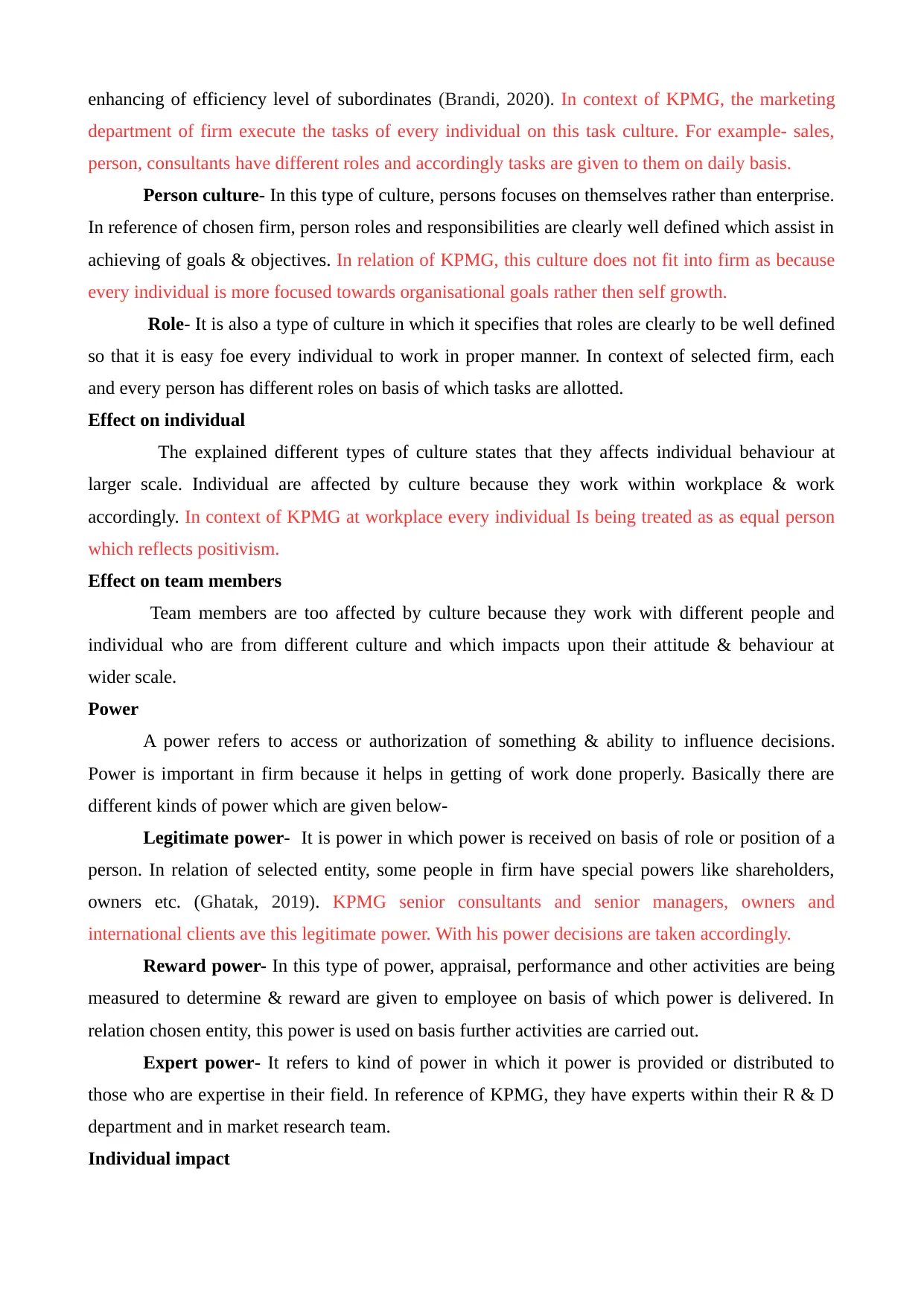
enhancing of efficiency level of subordinates (Brandi, 2020). In context of KPMG, the marketing
department of firm execute the tasks of every individual on this task culture. For example- sales,
person, consultants have different roles and accordingly tasks are given to them on daily basis.
Person culture- In this type of culture, persons focuses on themselves rather than enterprise.
In reference of chosen firm, person roles and responsibilities are clearly well defined which assist in
achieving of goals & objectives. In relation of KPMG, this culture does not fit into firm as because
every individual is more focused towards organisational goals rather then self growth.
Role- It is also a type of culture in which it specifies that roles are clearly to be well defined
so that it is easy foe every individual to work in proper manner. In context of selected firm, each
and every person has different roles on basis of which tasks are allotted.
Effect on individual
The explained different types of culture states that they affects individual behaviour at
larger scale. Individual are affected by culture because they work within workplace & work
accordingly. In context of KPMG at workplace every individual Is being treated as as equal person
which reflects positivism.
Effect on team members
Team members are too affected by culture because they work with different people and
individual who are from different culture and which impacts upon their attitude & behaviour at
wider scale.
Power
A power refers to access or authorization of something & ability to influence decisions.
Power is important in firm because it helps in getting of work done properly. Basically there are
different kinds of power which are given below-
Legitimate power- It is power in which power is received on basis of role or position of a
person. In relation of selected entity, some people in firm have special powers like shareholders,
owners etc. (Ghatak, 2019). KPMG senior consultants and senior managers, owners and
international clients ave this legitimate power. With his power decisions are taken accordingly.
Reward power- In this type of power, appraisal, performance and other activities are being
measured to determine & reward are given to employee on basis of which power is delivered. In
relation chosen entity, this power is used on basis further activities are carried out.
Expert power- It refers to kind of power in which it power is provided or distributed to
those who are expertise in their field. In reference of KPMG, they have experts within their R & D
department and in market research team.
Individual impact
department of firm execute the tasks of every individual on this task culture. For example- sales,
person, consultants have different roles and accordingly tasks are given to them on daily basis.
Person culture- In this type of culture, persons focuses on themselves rather than enterprise.
In reference of chosen firm, person roles and responsibilities are clearly well defined which assist in
achieving of goals & objectives. In relation of KPMG, this culture does not fit into firm as because
every individual is more focused towards organisational goals rather then self growth.
Role- It is also a type of culture in which it specifies that roles are clearly to be well defined
so that it is easy foe every individual to work in proper manner. In context of selected firm, each
and every person has different roles on basis of which tasks are allotted.
Effect on individual
The explained different types of culture states that they affects individual behaviour at
larger scale. Individual are affected by culture because they work within workplace & work
accordingly. In context of KPMG at workplace every individual Is being treated as as equal person
which reflects positivism.
Effect on team members
Team members are too affected by culture because they work with different people and
individual who are from different culture and which impacts upon their attitude & behaviour at
wider scale.
Power
A power refers to access or authorization of something & ability to influence decisions.
Power is important in firm because it helps in getting of work done properly. Basically there are
different kinds of power which are given below-
Legitimate power- It is power in which power is received on basis of role or position of a
person. In relation of selected entity, some people in firm have special powers like shareholders,
owners etc. (Ghatak, 2019). KPMG senior consultants and senior managers, owners and
international clients ave this legitimate power. With his power decisions are taken accordingly.
Reward power- In this type of power, appraisal, performance and other activities are being
measured to determine & reward are given to employee on basis of which power is delivered. In
relation chosen entity, this power is used on basis further activities are carried out.
Expert power- It refers to kind of power in which it power is provided or distributed to
those who are expertise in their field. In reference of KPMG, they have experts within their R & D
department and in market research team.
Individual impact
Paraphrase This Document
Need a fresh take? Get an instant paraphrase of this document with our AI Paraphraser
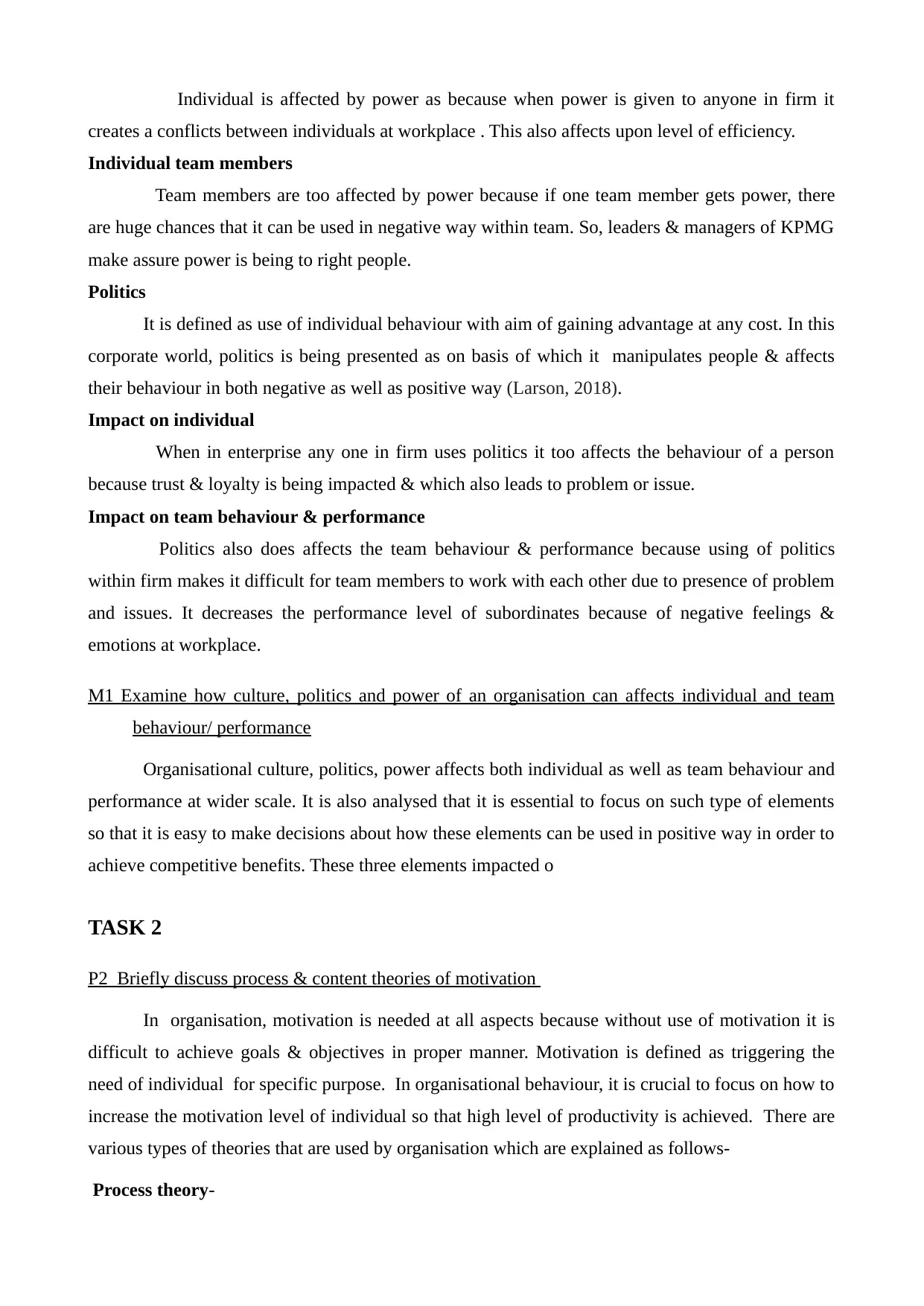
Individual is affected by power as because when power is given to anyone in firm it
creates a conflicts between individuals at workplace . This also affects upon level of efficiency.
Individual team members
Team members are too affected by power because if one team member gets power, there
are huge chances that it can be used in negative way within team. So, leaders & managers of KPMG
make assure power is being to right people.
Politics
It is defined as use of individual behaviour with aim of gaining advantage at any cost. In this
corporate world, politics is being presented as on basis of which it manipulates people & affects
their behaviour in both negative as well as positive way (Larson, 2018).
Impact on individual
When in enterprise any one in firm uses politics it too affects the behaviour of a person
because trust & loyalty is being impacted & which also leads to problem or issue.
Impact on team behaviour & performance
Politics also does affects the team behaviour & performance because using of politics
within firm makes it difficult for team members to work with each other due to presence of problem
and issues. It decreases the performance level of subordinates because of negative feelings &
emotions at workplace.
M1 Examine how culture, politics and power of an organisation can affects individual and team
behaviour/ performance
Organisational culture, politics, power affects both individual as well as team behaviour and
performance at wider scale. It is also analysed that it is essential to focus on such type of elements
so that it is easy to make decisions about how these elements can be used in positive way in order to
achieve competitive benefits. These three elements impacted o
TASK 2
P2 Briefly discuss process & content theories of motivation
In organisation, motivation is needed at all aspects because without use of motivation it is
difficult to achieve goals & objectives in proper manner. Motivation is defined as triggering the
need of individual for specific purpose. In organisational behaviour, it is crucial to focus on how to
increase the motivation level of individual so that high level of productivity is achieved. There are
various types of theories that are used by organisation which are explained as follows-
Process theory-
creates a conflicts between individuals at workplace . This also affects upon level of efficiency.
Individual team members
Team members are too affected by power because if one team member gets power, there
are huge chances that it can be used in negative way within team. So, leaders & managers of KPMG
make assure power is being to right people.
Politics
It is defined as use of individual behaviour with aim of gaining advantage at any cost. In this
corporate world, politics is being presented as on basis of which it manipulates people & affects
their behaviour in both negative as well as positive way (Larson, 2018).
Impact on individual
When in enterprise any one in firm uses politics it too affects the behaviour of a person
because trust & loyalty is being impacted & which also leads to problem or issue.
Impact on team behaviour & performance
Politics also does affects the team behaviour & performance because using of politics
within firm makes it difficult for team members to work with each other due to presence of problem
and issues. It decreases the performance level of subordinates because of negative feelings &
emotions at workplace.
M1 Examine how culture, politics and power of an organisation can affects individual and team
behaviour/ performance
Organisational culture, politics, power affects both individual as well as team behaviour and
performance at wider scale. It is also analysed that it is essential to focus on such type of elements
so that it is easy to make decisions about how these elements can be used in positive way in order to
achieve competitive benefits. These three elements impacted o
TASK 2
P2 Briefly discuss process & content theories of motivation
In organisation, motivation is needed at all aspects because without use of motivation it is
difficult to achieve goals & objectives in proper manner. Motivation is defined as triggering the
need of individual for specific purpose. In organisational behaviour, it is crucial to focus on how to
increase the motivation level of individual so that high level of productivity is achieved. There are
various types of theories that are used by organisation which are explained as follows-
Process theory-
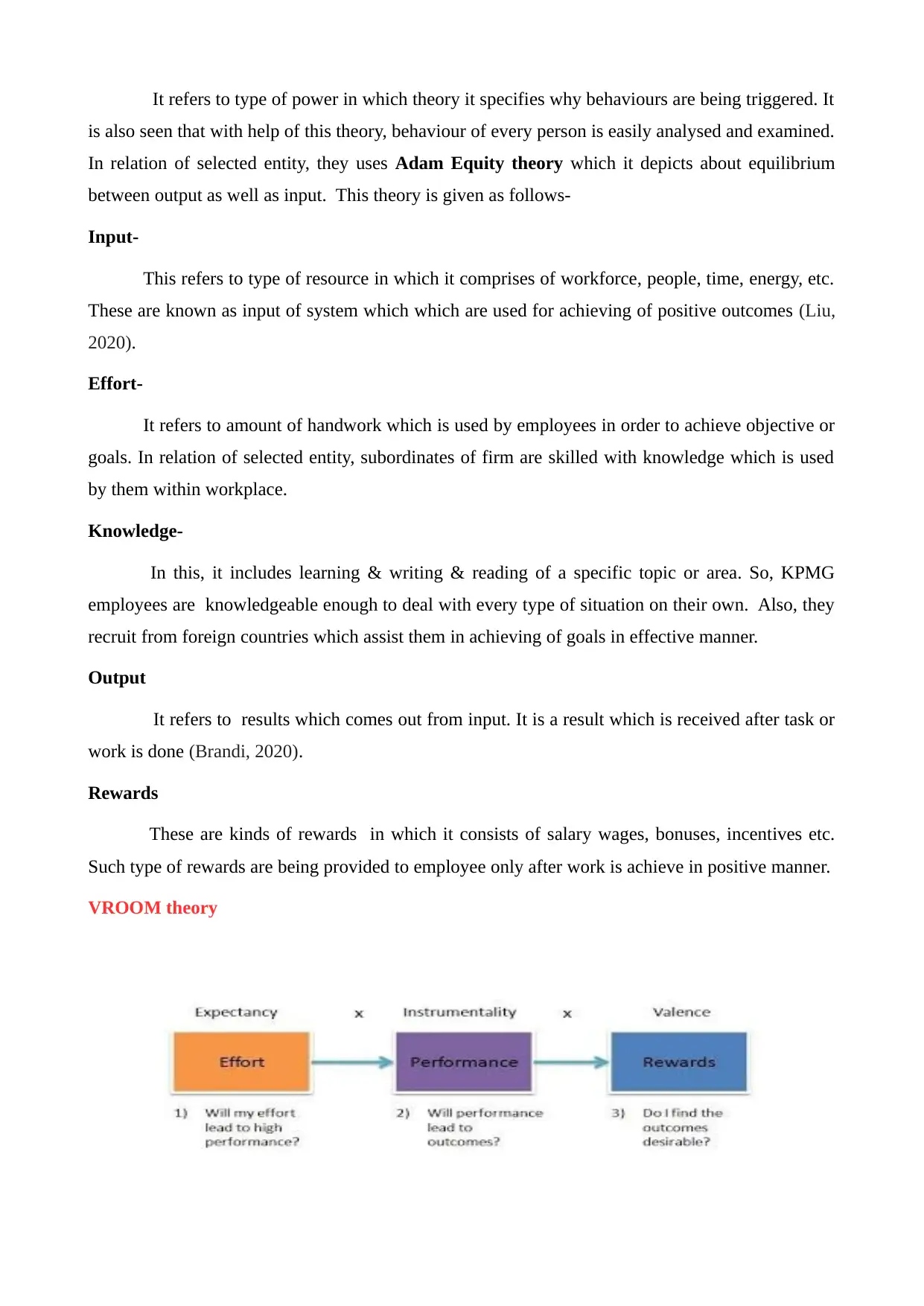
It refers to type of power in which theory it specifies why behaviours are being triggered. It
is also seen that with help of this theory, behaviour of every person is easily analysed and examined.
In relation of selected entity, they uses Adam Equity theory which it depicts about equilibrium
between output as well as input. This theory is given as follows-
Input-
This refers to type of resource in which it comprises of workforce, people, time, energy, etc.
These are known as input of system which which are used for achieving of positive outcomes (Liu,
2020).
Effort-
It refers to amount of handwork which is used by employees in order to achieve objective or
goals. In relation of selected entity, subordinates of firm are skilled with knowledge which is used
by them within workplace.
Knowledge-
In this, it includes learning & writing & reading of a specific topic or area. So, KPMG
employees are knowledgeable enough to deal with every type of situation on their own. Also, they
recruit from foreign countries which assist them in achieving of goals in effective manner.
Output
It refers to results which comes out from input. It is a result which is received after task or
work is done (Brandi, 2020).
Rewards
These are kinds of rewards in which it consists of salary wages, bonuses, incentives etc.
Such type of rewards are being provided to employee only after work is achieve in positive manner.
VROOM theory
is also seen that with help of this theory, behaviour of every person is easily analysed and examined.
In relation of selected entity, they uses Adam Equity theory which it depicts about equilibrium
between output as well as input. This theory is given as follows-
Input-
This refers to type of resource in which it comprises of workforce, people, time, energy, etc.
These are known as input of system which which are used for achieving of positive outcomes (Liu,
2020).
Effort-
It refers to amount of handwork which is used by employees in order to achieve objective or
goals. In relation of selected entity, subordinates of firm are skilled with knowledge which is used
by them within workplace.
Knowledge-
In this, it includes learning & writing & reading of a specific topic or area. So, KPMG
employees are knowledgeable enough to deal with every type of situation on their own. Also, they
recruit from foreign countries which assist them in achieving of goals in effective manner.
Output
It refers to results which comes out from input. It is a result which is received after task or
work is done (Brandi, 2020).
Rewards
These are kinds of rewards in which it consists of salary wages, bonuses, incentives etc.
Such type of rewards are being provided to employee only after work is achieve in positive manner.
VROOM theory
⊘ This is a preview!⊘
Do you want full access?
Subscribe today to unlock all pages.

Trusted by 1+ million students worldwide
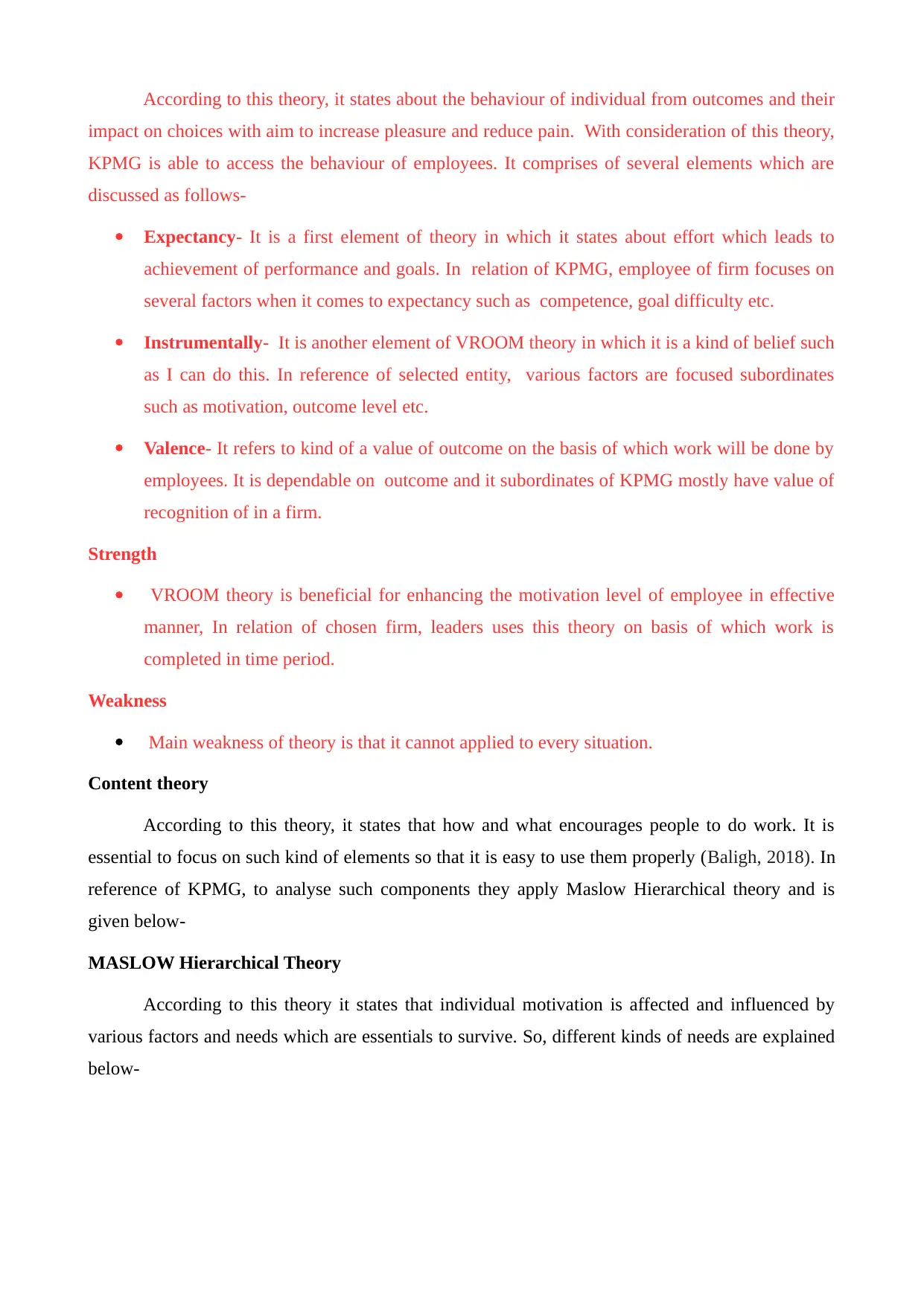
According to this theory, it states about the behaviour of individual from outcomes and their
impact on choices with aim to increase pleasure and reduce pain. With consideration of this theory,
KPMG is able to access the behaviour of employees. It comprises of several elements which are
discussed as follows-
Expectancy- It is a first element of theory in which it states about effort which leads to
achievement of performance and goals. In relation of KPMG, employee of firm focuses on
several factors when it comes to expectancy such as competence, goal difficulty etc.
Instrumentally- It is another element of VROOM theory in which it is a kind of belief such
as I can do this. In reference of selected entity, various factors are focused subordinates
such as motivation, outcome level etc.
Valence- It refers to kind of a value of outcome on the basis of which work will be done by
employees. It is dependable on outcome and it subordinates of KPMG mostly have value of
recognition of in a firm.
Strength
VROOM theory is beneficial for enhancing the motivation level of employee in effective
manner, In relation of chosen firm, leaders uses this theory on basis of which work is
completed in time period.
Weakness
Main weakness of theory is that it cannot applied to every situation.
Content theory
According to this theory, it states that how and what encourages people to do work. It is
essential to focus on such kind of elements so that it is easy to use them properly (Baligh, 2018). In
reference of KPMG, to analyse such components they apply Maslow Hierarchical theory and is
given below-
MASLOW Hierarchical Theory
According to this theory it states that individual motivation is affected and influenced by
various factors and needs which are essentials to survive. So, different kinds of needs are explained
below-
impact on choices with aim to increase pleasure and reduce pain. With consideration of this theory,
KPMG is able to access the behaviour of employees. It comprises of several elements which are
discussed as follows-
Expectancy- It is a first element of theory in which it states about effort which leads to
achievement of performance and goals. In relation of KPMG, employee of firm focuses on
several factors when it comes to expectancy such as competence, goal difficulty etc.
Instrumentally- It is another element of VROOM theory in which it is a kind of belief such
as I can do this. In reference of selected entity, various factors are focused subordinates
such as motivation, outcome level etc.
Valence- It refers to kind of a value of outcome on the basis of which work will be done by
employees. It is dependable on outcome and it subordinates of KPMG mostly have value of
recognition of in a firm.
Strength
VROOM theory is beneficial for enhancing the motivation level of employee in effective
manner, In relation of chosen firm, leaders uses this theory on basis of which work is
completed in time period.
Weakness
Main weakness of theory is that it cannot applied to every situation.
Content theory
According to this theory, it states that how and what encourages people to do work. It is
essential to focus on such kind of elements so that it is easy to use them properly (Baligh, 2018). In
reference of KPMG, to analyse such components they apply Maslow Hierarchical theory and is
given below-
MASLOW Hierarchical Theory
According to this theory it states that individual motivation is affected and influenced by
various factors and needs which are essentials to survive. So, different kinds of needs are explained
below-
Paraphrase This Document
Need a fresh take? Get an instant paraphrase of this document with our AI Paraphraser
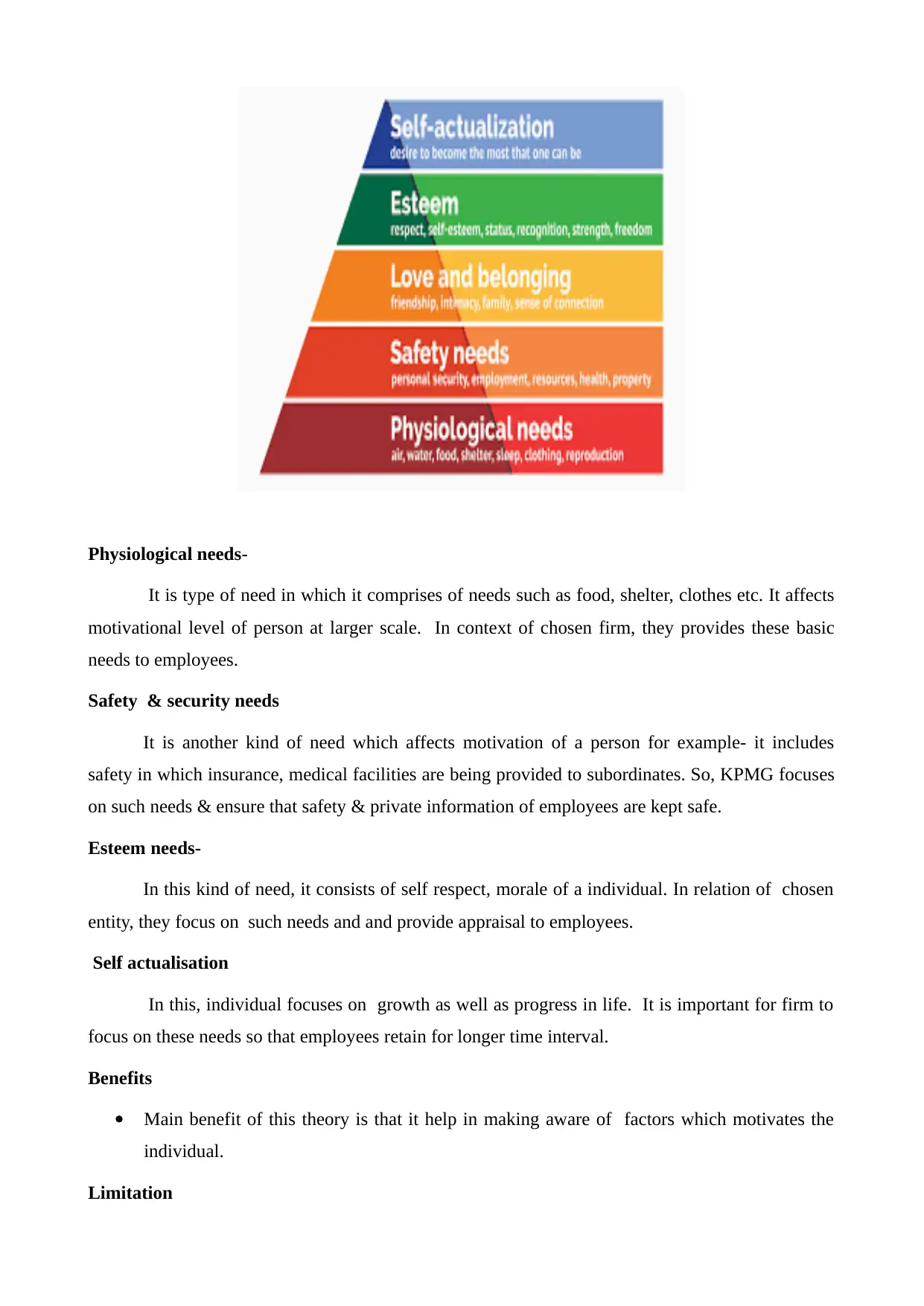
Physiological needs-
It is type of need in which it comprises of needs such as food, shelter, clothes etc. It affects
motivational level of person at larger scale. In context of chosen firm, they provides these basic
needs to employees.
Safety & security needs
It is another kind of need which affects motivation of a person for example- it includes
safety in which insurance, medical facilities are being provided to subordinates. So, KPMG focuses
on such needs & ensure that safety & private information of employees are kept safe.
Esteem needs-
In this kind of need, it consists of self respect, morale of a individual. In relation of chosen
entity, they focus on such needs and and provide appraisal to employees.
Self actualisation
In this, individual focuses on growth as well as progress in life. It is important for firm to
focus on these needs so that employees retain for longer time interval.
Benefits
Main benefit of this theory is that it help in making aware of factors which motivates the
individual.
Limitation
It is type of need in which it comprises of needs such as food, shelter, clothes etc. It affects
motivational level of person at larger scale. In context of chosen firm, they provides these basic
needs to employees.
Safety & security needs
It is another kind of need which affects motivation of a person for example- it includes
safety in which insurance, medical facilities are being provided to subordinates. So, KPMG focuses
on such needs & ensure that safety & private information of employees are kept safe.
Esteem needs-
In this kind of need, it consists of self respect, morale of a individual. In relation of chosen
entity, they focus on such needs and and provide appraisal to employees.
Self actualisation
In this, individual focuses on growth as well as progress in life. It is important for firm to
focus on these needs so that employees retain for longer time interval.
Benefits
Main benefit of this theory is that it help in making aware of factors which motivates the
individual.
Limitation
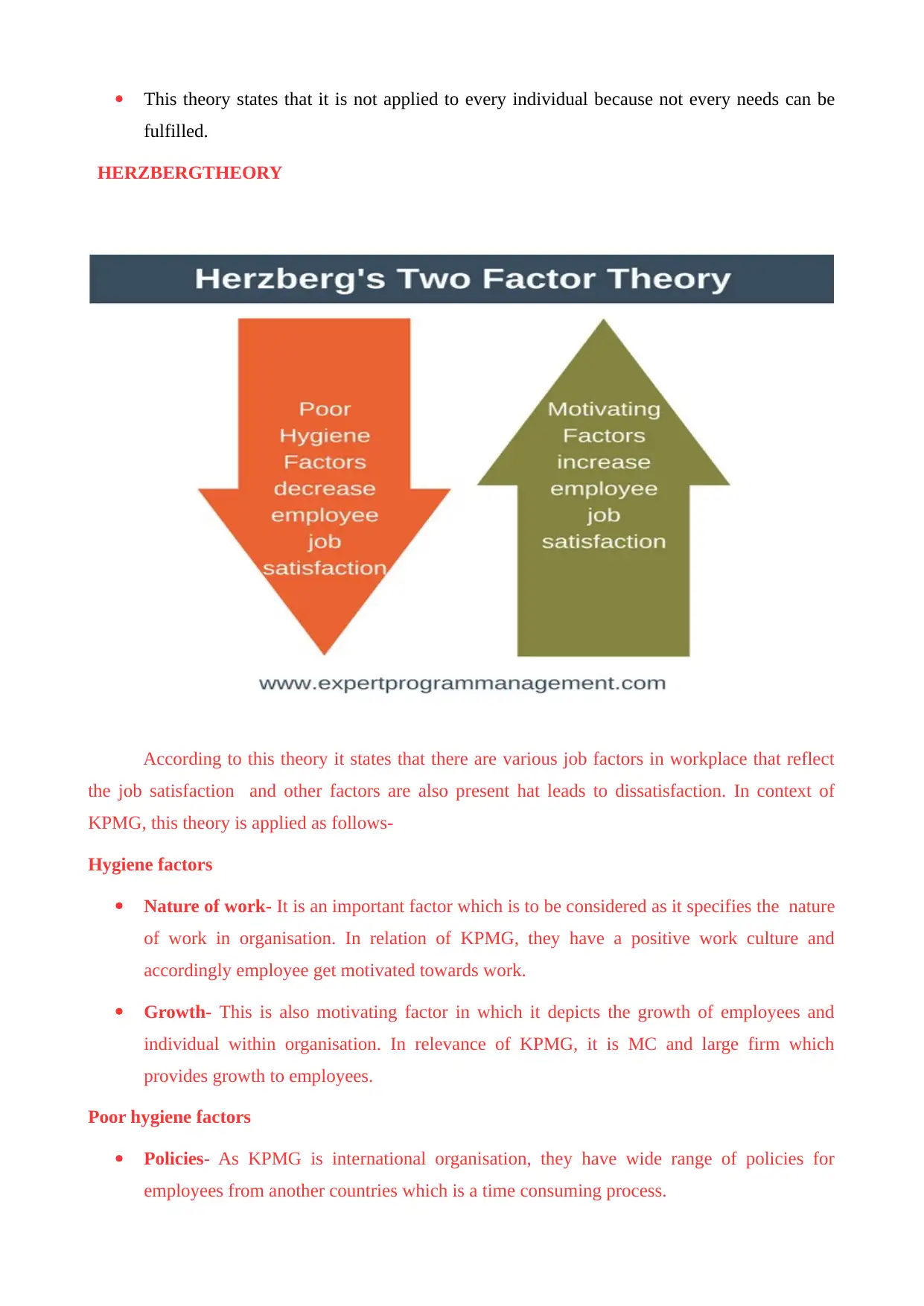
This theory states that it is not applied to every individual because not every needs can be
fulfilled.
HERZBERGTHEORY
According to this theory it states that there are various job factors in workplace that reflect
the job satisfaction and other factors are also present hat leads to dissatisfaction. In context of
KPMG, this theory is applied as follows-
Hygiene factors
Nature of work- It is an important factor which is to be considered as it specifies the nature
of work in organisation. In relation of KPMG, they have a positive work culture and
accordingly employee get motivated towards work.
Growth- This is also motivating factor in which it depicts the growth of employees and
individual within organisation. In relevance of KPMG, it is MC and large firm which
provides growth to employees.
Poor hygiene factors
Policies- As KPMG is international organisation, they have wide range of policies for
employees from another countries which is a time consuming process.
fulfilled.
HERZBERGTHEORY
According to this theory it states that there are various job factors in workplace that reflect
the job satisfaction and other factors are also present hat leads to dissatisfaction. In context of
KPMG, this theory is applied as follows-
Hygiene factors
Nature of work- It is an important factor which is to be considered as it specifies the nature
of work in organisation. In relation of KPMG, they have a positive work culture and
accordingly employee get motivated towards work.
Growth- This is also motivating factor in which it depicts the growth of employees and
individual within organisation. In relevance of KPMG, it is MC and large firm which
provides growth to employees.
Poor hygiene factors
Policies- As KPMG is international organisation, they have wide range of policies for
employees from another countries which is a time consuming process.
⊘ This is a preview!⊘
Do you want full access?
Subscribe today to unlock all pages.

Trusted by 1+ million students worldwide
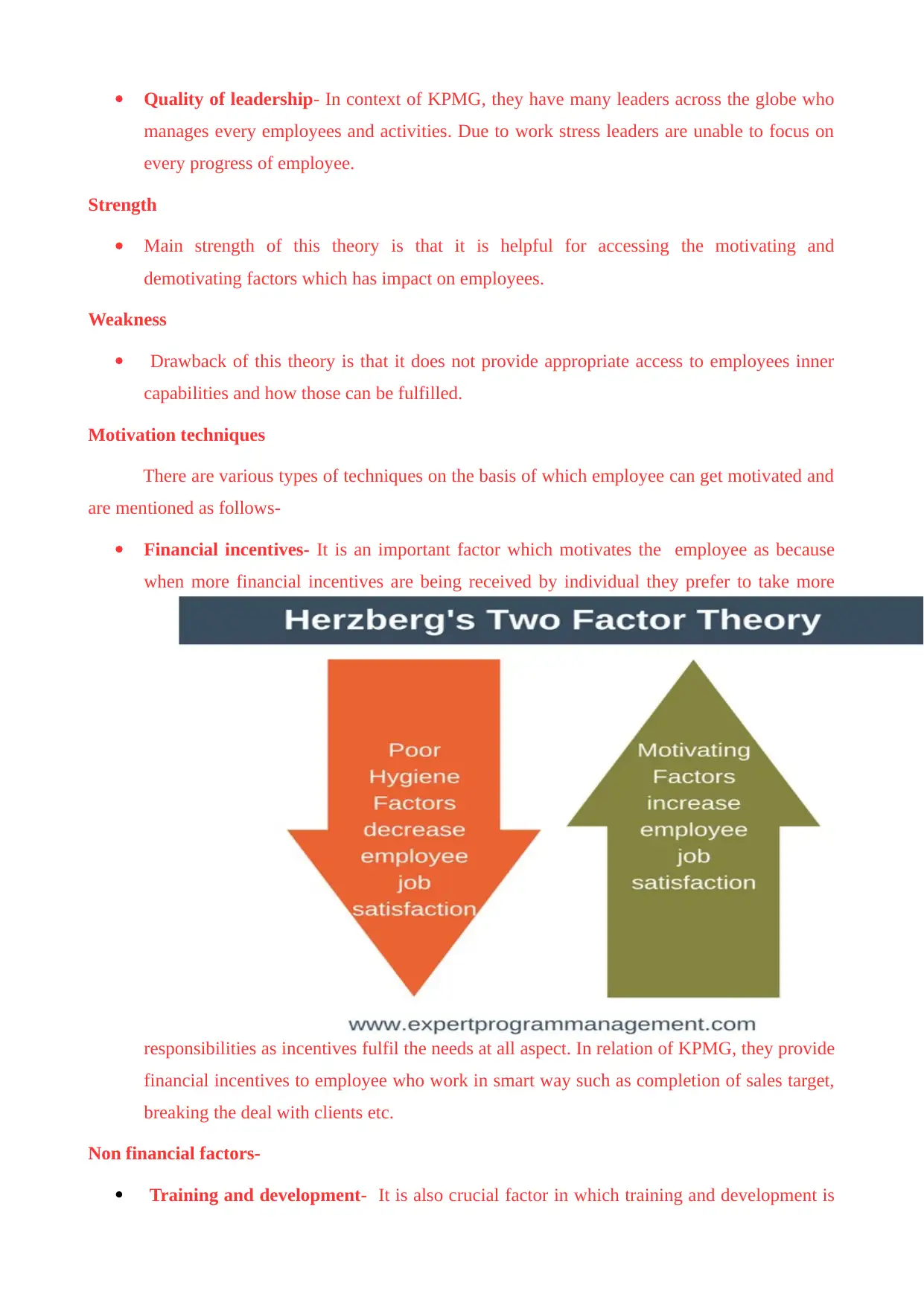
Quality of leadership- In context of KPMG, they have many leaders across the globe who
manages every employees and activities. Due to work stress leaders are unable to focus on
every progress of employee.
Strength
Main strength of this theory is that it is helpful for accessing the motivating and
demotivating factors which has impact on employees.
Weakness
Drawback of this theory is that it does not provide appropriate access to employees inner
capabilities and how those can be fulfilled.
Motivation techniques
There are various types of techniques on the basis of which employee can get motivated and
are mentioned as follows-
Financial incentives- It is an important factor which motivates the employee as because
when more financial incentives are being received by individual they prefer to take more
responsibilities as incentives fulfil the needs at all aspect. In relation of KPMG, they provide
financial incentives to employee who work in smart way such as completion of sales target,
breaking the deal with clients etc.
Non financial factors-
Training and development- It is also crucial factor in which training and development is
manages every employees and activities. Due to work stress leaders are unable to focus on
every progress of employee.
Strength
Main strength of this theory is that it is helpful for accessing the motivating and
demotivating factors which has impact on employees.
Weakness
Drawback of this theory is that it does not provide appropriate access to employees inner
capabilities and how those can be fulfilled.
Motivation techniques
There are various types of techniques on the basis of which employee can get motivated and
are mentioned as follows-
Financial incentives- It is an important factor which motivates the employee as because
when more financial incentives are being received by individual they prefer to take more
responsibilities as incentives fulfil the needs at all aspect. In relation of KPMG, they provide
financial incentives to employee who work in smart way such as completion of sales target,
breaking the deal with clients etc.
Non financial factors-
Training and development- It is also crucial factor in which training and development is
Paraphrase This Document
Need a fresh take? Get an instant paraphrase of this document with our AI Paraphraser
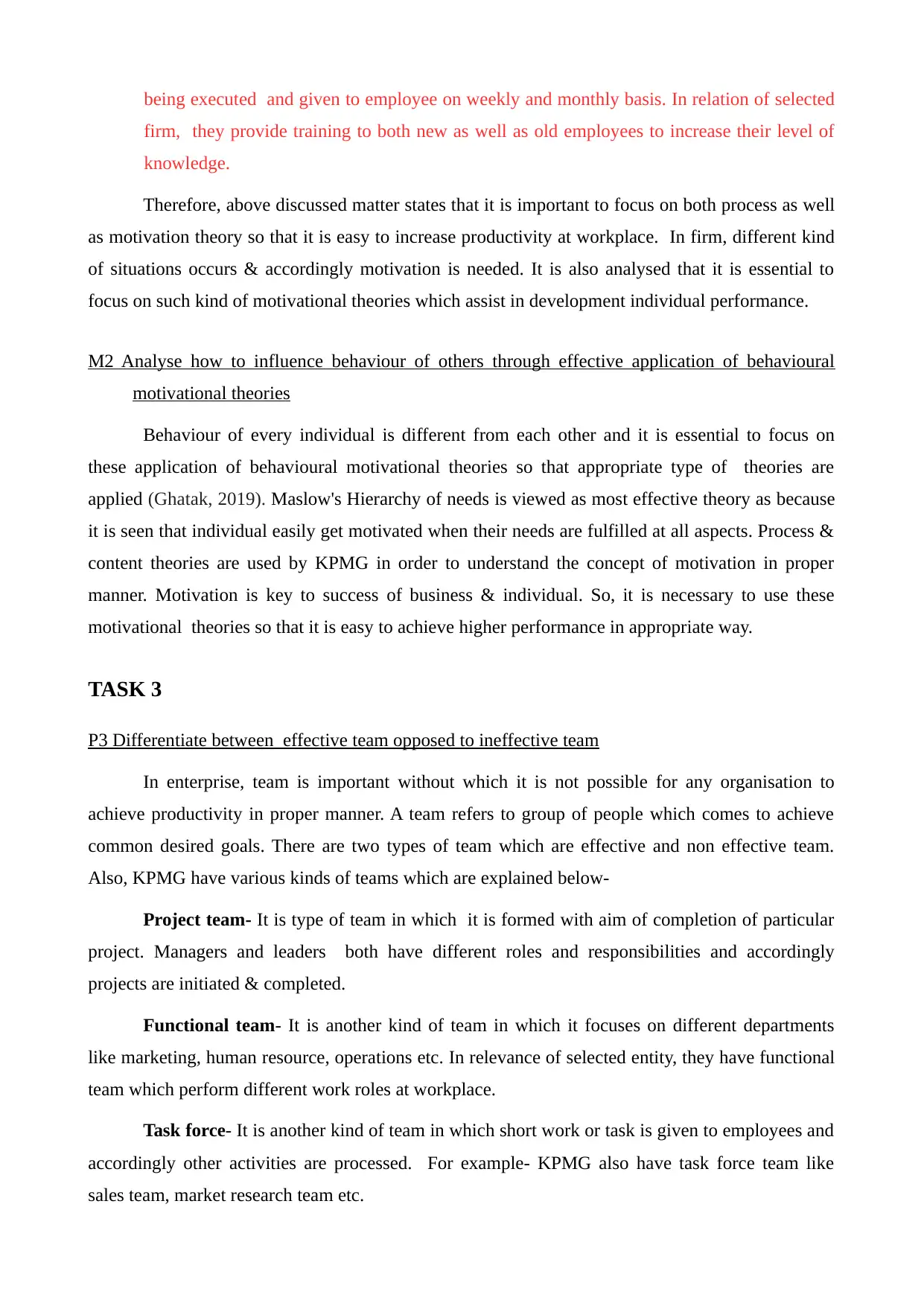
being executed and given to employee on weekly and monthly basis. In relation of selected
firm, they provide training to both new as well as old employees to increase their level of
knowledge.
Therefore, above discussed matter states that it is important to focus on both process as well
as motivation theory so that it is easy to increase productivity at workplace. In firm, different kind
of situations occurs & accordingly motivation is needed. It is also analysed that it is essential to
focus on such kind of motivational theories which assist in development individual performance.
M2 Analyse how to influence behaviour of others through effective application of behavioural
motivational theories
Behaviour of every individual is different from each other and it is essential to focus on
these application of behavioural motivational theories so that appropriate type of theories are
applied (Ghatak, 2019). Maslow's Hierarchy of needs is viewed as most effective theory as because
it is seen that individual easily get motivated when their needs are fulfilled at all aspects. Process &
content theories are used by KPMG in order to understand the concept of motivation in proper
manner. Motivation is key to success of business & individual. So, it is necessary to use these
motivational theories so that it is easy to achieve higher performance in appropriate way.
TASK 3
P3 Differentiate between effective team opposed to ineffective team
In enterprise, team is important without which it is not possible for any organisation to
achieve productivity in proper manner. A team refers to group of people which comes to achieve
common desired goals. There are two types of team which are effective and non effective team.
Also, KPMG have various kinds of teams which are explained below-
Project team- It is type of team in which it is formed with aim of completion of particular
project. Managers and leaders both have different roles and responsibilities and accordingly
projects are initiated & completed.
Functional team- It is another kind of team in which it focuses on different departments
like marketing, human resource, operations etc. In relevance of selected entity, they have functional
team which perform different work roles at workplace.
Task force- It is another kind of team in which short work or task is given to employees and
accordingly other activities are processed. For example- KPMG also have task force team like
sales team, market research team etc.
firm, they provide training to both new as well as old employees to increase their level of
knowledge.
Therefore, above discussed matter states that it is important to focus on both process as well
as motivation theory so that it is easy to increase productivity at workplace. In firm, different kind
of situations occurs & accordingly motivation is needed. It is also analysed that it is essential to
focus on such kind of motivational theories which assist in development individual performance.
M2 Analyse how to influence behaviour of others through effective application of behavioural
motivational theories
Behaviour of every individual is different from each other and it is essential to focus on
these application of behavioural motivational theories so that appropriate type of theories are
applied (Ghatak, 2019). Maslow's Hierarchy of needs is viewed as most effective theory as because
it is seen that individual easily get motivated when their needs are fulfilled at all aspects. Process &
content theories are used by KPMG in order to understand the concept of motivation in proper
manner. Motivation is key to success of business & individual. So, it is necessary to use these
motivational theories so that it is easy to achieve higher performance in appropriate way.
TASK 3
P3 Differentiate between effective team opposed to ineffective team
In enterprise, team is important without which it is not possible for any organisation to
achieve productivity in proper manner. A team refers to group of people which comes to achieve
common desired goals. There are two types of team which are effective and non effective team.
Also, KPMG have various kinds of teams which are explained below-
Project team- It is type of team in which it is formed with aim of completion of particular
project. Managers and leaders both have different roles and responsibilities and accordingly
projects are initiated & completed.
Functional team- It is another kind of team in which it focuses on different departments
like marketing, human resource, operations etc. In relevance of selected entity, they have functional
team which perform different work roles at workplace.
Task force- It is another kind of team in which short work or task is given to employees and
accordingly other activities are processed. For example- KPMG also have task force team like
sales team, market research team etc.
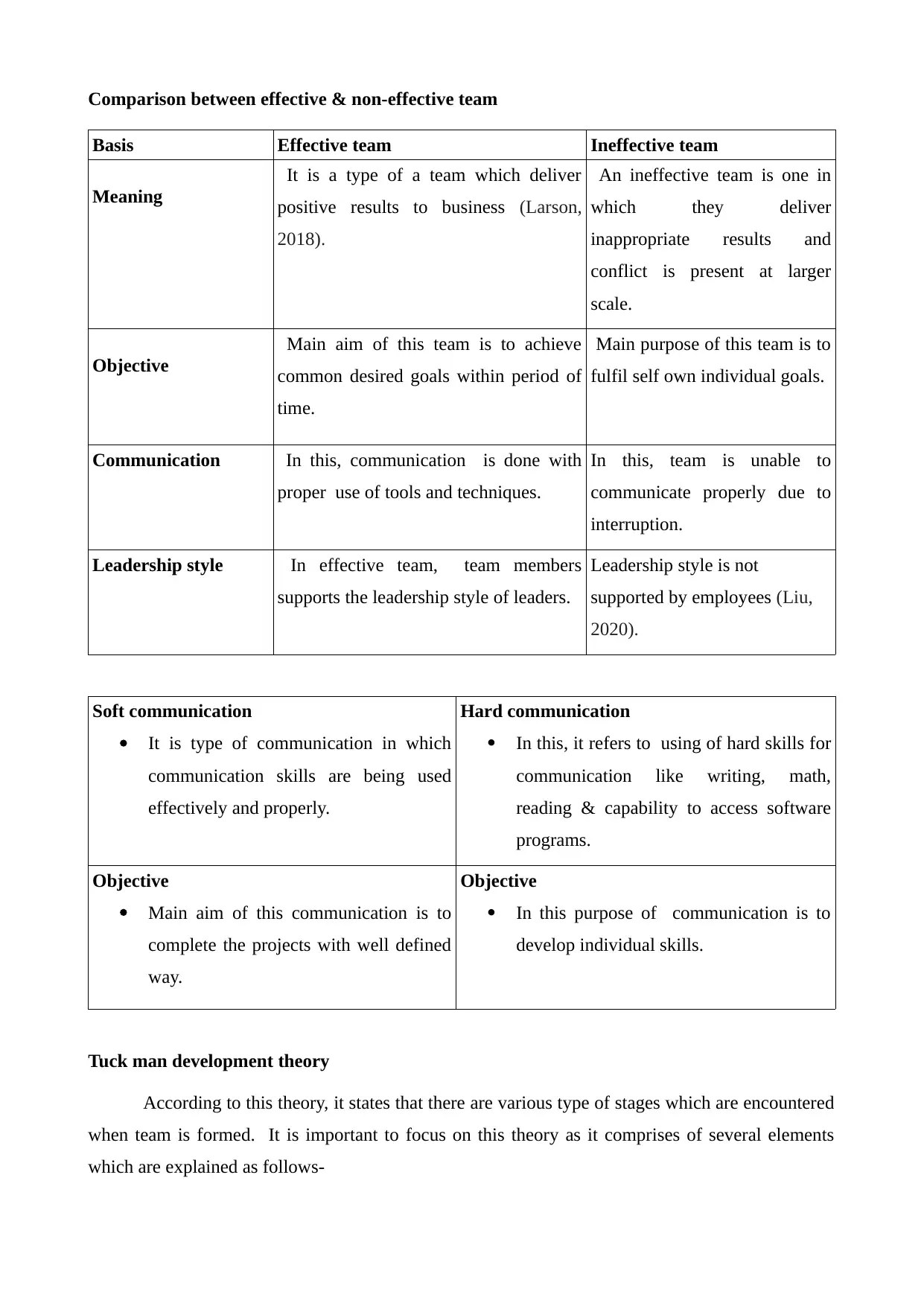
Comparison between effective & non-effective team
Basis Effective team Ineffective team
Meaning
It is a type of a team which deliver
positive results to business (Larson,
2018).
An ineffective team is one in
which they deliver
inappropriate results and
conflict is present at larger
scale.
Objective
Main aim of this team is to achieve
common desired goals within period of
time.
Main purpose of this team is to
fulfil self own individual goals.
Communication In this, communication is done with
proper use of tools and techniques.
In this, team is unable to
communicate properly due to
interruption.
Leadership style In effective team, team members
supports the leadership style of leaders.
Leadership style is not
supported by employees (Liu,
2020).
Soft communication
It is type of communication in which
communication skills are being used
effectively and properly.
Hard communication
In this, it refers to using of hard skills for
communication like writing, math,
reading & capability to access software
programs.
Objective
Main aim of this communication is to
complete the projects with well defined
way.
Objective
In this purpose of communication is to
develop individual skills.
Tuck man development theory
According to this theory, it states that there are various type of stages which are encountered
when team is formed. It is important to focus on this theory as it comprises of several elements
which are explained as follows-
Basis Effective team Ineffective team
Meaning
It is a type of a team which deliver
positive results to business (Larson,
2018).
An ineffective team is one in
which they deliver
inappropriate results and
conflict is present at larger
scale.
Objective
Main aim of this team is to achieve
common desired goals within period of
time.
Main purpose of this team is to
fulfil self own individual goals.
Communication In this, communication is done with
proper use of tools and techniques.
In this, team is unable to
communicate properly due to
interruption.
Leadership style In effective team, team members
supports the leadership style of leaders.
Leadership style is not
supported by employees (Liu,
2020).
Soft communication
It is type of communication in which
communication skills are being used
effectively and properly.
Hard communication
In this, it refers to using of hard skills for
communication like writing, math,
reading & capability to access software
programs.
Objective
Main aim of this communication is to
complete the projects with well defined
way.
Objective
In this purpose of communication is to
develop individual skills.
Tuck man development theory
According to this theory, it states that there are various type of stages which are encountered
when team is formed. It is important to focus on this theory as it comprises of several elements
which are explained as follows-
⊘ This is a preview!⊘
Do you want full access?
Subscribe today to unlock all pages.

Trusted by 1+ million students worldwide
1 out of 21
Related Documents
Your All-in-One AI-Powered Toolkit for Academic Success.
+13062052269
info@desklib.com
Available 24*7 on WhatsApp / Email
![[object Object]](/_next/static/media/star-bottom.7253800d.svg)
Unlock your academic potential
Copyright © 2020–2026 A2Z Services. All Rights Reserved. Developed and managed by ZUCOL.



